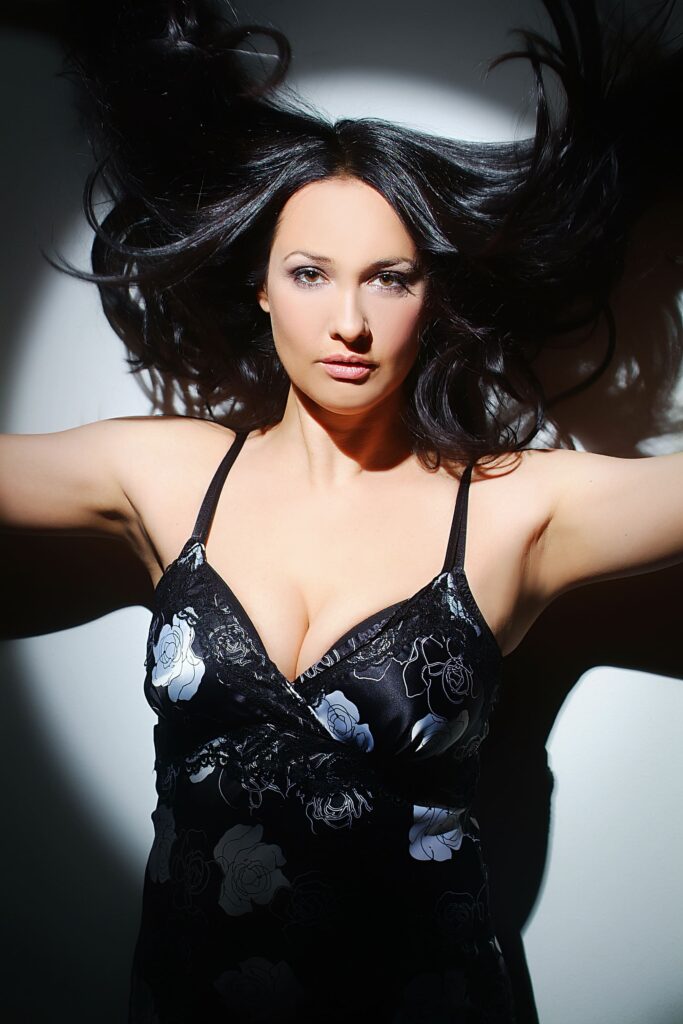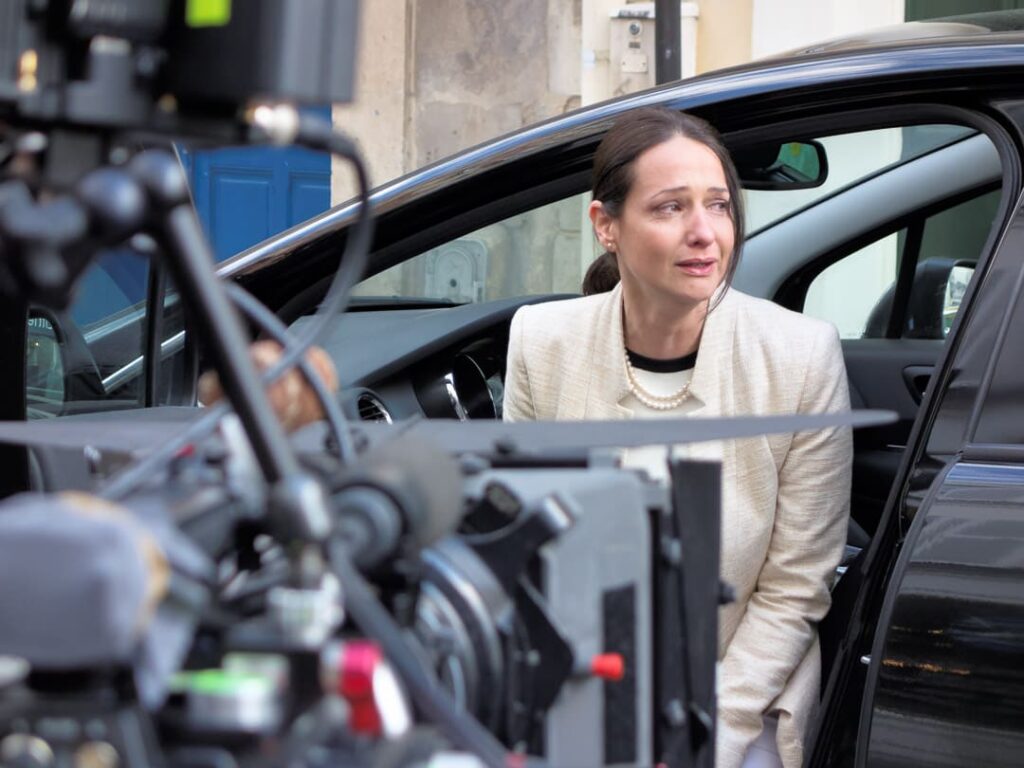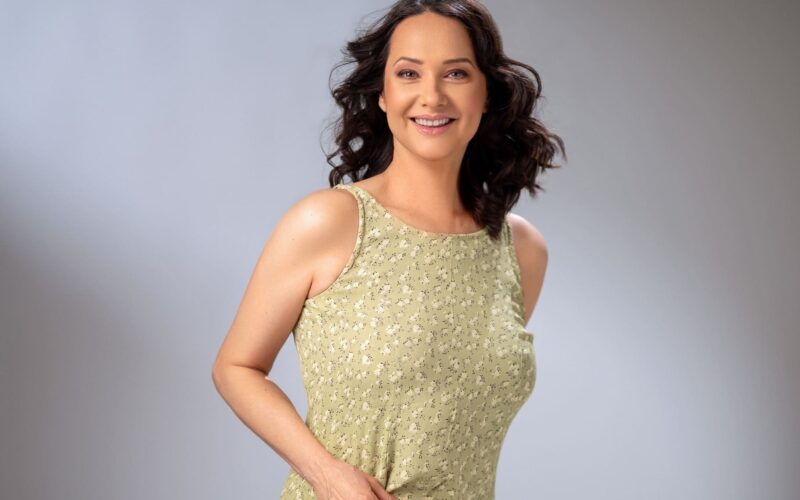In this conversation with Indie Wrap, Kristina reflects on her beginnings in musical theatre, the lessons she learned from legendary acting coaches, the transition into screen acting, and her growing passion for producing and writing. Above all, she shares why she believes the most personal stories often become the most universal.
From musical theatre stages in Hungary to red carpets at Cannes — what first sparked your love for performing, and how has that passion evolved over the years?
I grew up in a family where music was at the heart of everything. From an early age I studied piano, solfège, and voice, and my parents encouraged me every step of the way. Even though my father was a mathematician and physicist, he believed in exposing me to the arts—he sent me to folk dance, ballet, and later I graduated from the Conservatory in Budapest with a major in classical singing. By the age of sixteen I was already on stage, playing leading roles in musicals and I played ingénue roles in comedies.
At first, I imagined my career would continue on a musical path internationally as well. When I moved to London in my mid-twenties, I thought I would remain within music and musical theatre. But then came a turning point: I was admitted to the Actor’s Centre, where my London agent sent me to train with Jack Waltzer in New York—the legendary coach who worked with Sharon Stone, Dustin Hoffman, and Susan Sarandon.
I’ll never forget that moment. Despite my years of stage experience, I had butterflies in my stomach. After only ten minutes, Jack looked at me and said: “Christine, you are a dramatic actress.” He added that my place was in screen acting. It was a revelation. Suddenly, I had to make a difficult choice: to leave behind leading roles in Hungary and start from scratch in an entirely new world. My agent warned me it wouldn’t be easy, especially as a Central European actress trying to enter the international film circuit, but he also saw potential in my Mediterranean look.
The transition wasn’t simple. On stage, you have to project with grand gestures for hundreds of people. In front of the camera, it’s all about intimacy and honesty in the smallest glance. Learning that shift required not only training but humility—to line up for auditions after having already played leads back home. Still, that encounter with Jack Waltzer truly shaped my destiny. It set me on the path of becoming a film actress.
You trained in London, New York, and Los Angeles with legendary acting coaches like Jack Waltzer and Bernard Hiller. What lessons from them still guide you on set today?
Indeed, meeting Jack Waltzer and Bernard Hiller was a turning point in my career. They were not only extraordinary masters of the craft, but they also reshaped the way I saw myself as an artist and as a person. To study the Meisner technique directly from Jack, who himself had learned it from Sanford Meisner, was a privilege. But beyond technique, what he gave me was belief, kindness, and self-worth. I can honestly say I became a different person after working with him.
Bernard Hiller, who has guided actors like Cameron Diaz, taught me something that stays with me every day: Hollywood is not some faraway dreamland. It’s a beautiful neighborhood in Los Angeles but what makes it magical is not the geography, but the people who dare to believe in themselves. Success, he reminded me, begins in the heart and the mind, not on a map.
From both of them I received more than training; they helped me transform my identity. And that is essential, because an actor always builds from their inner truth.
Your first major screen role was in the American-Canadian series Painkiller Jane. How did it feel to break into international television so early in your career?
I was very young when I was cast in Painkiller Jane, and I knew right away that I was chosen largely because of my appearance. Still, I was deeply grateful for the trust, and I also sensed that if I worked hard, it could become a stepping stone. I’ve always had a touch of fatalism in me, and I felt this was a sign from fate pointing me toward the path I was meant to take.
The series itself was a Canadian–American action show, and I enjoyed every moment of it. I remember standing on set the last day, and when it was over, I felt a kind of emptiness. I realized how much I loved this work and thought: “This is it. This is what I want to do with my life.” Of course, questions followed—would there be more opportunities? Would this momentum continue?
By that time, I had already studied at the New York Film Academy in Los Angeles, so I had both training and passion behind me. But deep inside, I felt a sense of trepidation about whether there would be a next step. Looking back, though, Painkiller Jane confirmed for me that screen acting was not only possible, but necessary.
You speak English, French, Italian, and Hungarian fluently. How has being multilingual shaped the kinds of roles you’re offered — and the way you approach character-building?
As European actors, we know very well that we don’t have the luxury of speaking only English. Luckily, I grew up learning several languages, but I quickly realized that speaking a language well is very different from being emotionally authentic in it as an actor.
When you say words like mother, death, or flower on screen, they must trigger the same subconscious associations and emotions as they would in your native tongue. That takes years of work. And beyond language itself, every culture expresses emotions differently. The joy of an Italian or Spanish character has a different rhythm than the joy of a Northern European one.
I’ve also noticed that when I act in English, French, or Italian, I almost think and feel differently, as though each language opens a new window in my mind. Being multilingual has not only shaped the range of roles I can play, but it has also deepened the way I build characters — from the inside out, through both words and culture.

You’ve played in everything from Hollywood war dramas to French avant-garde theatre. How do you adapt to such different creative worlds and styles of storytelling?
What I love most about my career is the multicultural aspect — working in different countries, meeting people from all over the world, and building friendships in places like Los Angeles, New York, Paris, and Rome. Travel opens you emotionally, and that openness is essential for an actor.
I’m deeply grateful that my work is so diverse. Whether it’s a Hollywood war drama, a French arthouse film, or an avant-garde play on stage, I always try to approach it with the same depth. Of course, each format demands a different technique — you act differently for a big action movie than for an intimate arthouse film, and differently again for television. Even though I’ve never played in sitcoms or daily soap operas, my training gave me the confidence that I could adapt if needed.
At the New York Film Academy in Los Angeles, we were taught to move between genres with ease, so that no matter where you find yourself, you feel at home in the work. That versatility is a gift — even if you don’t pursue every genre, the knowledge that you could is empowering.
Your role as Christine Wiegel in The Man with the Iron Heart placed you alongside Jason Clarke and Rosamund Pike. What did you take away from that experience of working on a large-scale international production?
The Man with the Iron Heart was a remarkable experience. Although it was a film headlined by Hollywood stars like Jason Clarke and Rosamund Pike, it was directed by the French film director Cédric Jimenez, who gave me the opportunity to play Christine Wiegel, the mistress of Heinrich Himmler, who was portreyed by Jacon Clarke in the movie.
My agent told me this role would be a defining one, and he was right. Professionally it was a major step, but even more so on a human level. When you enter such a large-scale production, you realize: this is the standard I want to work at from now on. It’s not only about sharing the screen with world-renowned actors, but about the precision, professionalism, and calm focus that surrounded the set.
Cédric Jimenez impressed me deeply, what struck me most was how he directed actors — always precise, confident, and calm. For an actor, that sense of steadiness is invaluable. I remain grateful for the trust and the chance to be part of a project of that caliber.
In 2015, you performed at the Festival d’Avignon in a powerful two-person play about the Yugoslav wars. How did that experience influence your artistic sensibility and your love for French cinema?
In 2015, I was invited to perform in Matei Vișniec’s powerful two-person play Du sexe de la femme comme champ de bataille at the Festival d’Avignon. Before that, we premiered in Paris, then performed every day for a month at Avignon. Performing on the Côte d’Azur, surrounded by its magnificent beauty, was a truly uplifting experience.
Out of more than 1,200 performances, our play received the recognition of being the second-best production – an honor that made me incredibly proud.
I still remember being in Rome on a film shoot when the audition call came. I had to learn three monologues by heart in French in less than a week – it was a real challenge.0
To be honest, my French then was nowhere near as strong as my English or Italian, so I went into the multi-round audition with the calm of someone who had nothing to lose. To my surprise, almost at the same time, I received two offers: one for a major TV series in Italy — which would have meant months of shooting in beautiful southern Italy — and the other for the role of the American psychiatrist in Vișniec’s play about the Yugoslav wars. My agent told me it wasn’t even a question which one I should choose, and he was right. That decision became a turning point in my life.
During rehearsals in Paris, I would often slip into cinemas after work and devour French films. It didn’t feel like discovering something new, but like a continuation — the natural next step in my artistic journey. That’s when I truly fell in love with French cinema and culture. So much so that by 2018, I had produced and starred in my first French-language short film, followed by a second, Le Collier, both shot in Paris with French casts and crews. To this day, many of the friendships born during that period remain alive and precious.
You’ve founded your own Paris-based company, Gold Wood Pictures, which has now received official recognition from the CNC. What does this milestone mean to you as both a producer and an artist?
I’m truly proud and happy about this milestone, because CNC recognition is like a quality seal in France — it’s not automatically granted to every film. With my co-founder, film director Peter Korday, we feel this acknowledgment is worth as much as several awards. It reassures us that we’re on the right path.
For me, it’s also a reminder that if you do something with love and faith, you’re exactly where you’re supposed to be. I’m an actress first, not a typical producer. When I write a script, I don’t begin by running numbers or calculating how much money it might generate. I approach it with an artistic mindset, from the heart. Producing, for me, is driven by passion rather than business.
Of course, running a production company also means handling contracts, legal matters, and all the details that come with it. But Gold Wood Pictures was never created to take on outside commissions. From the start, our mission has been to develop and produce our own independent projects — original scripts, personal visions. Naturally, many of these works lean toward French arthouse cinema, which I feel is the artistic home where I belong.

Your latest feature, Flottant légèrement dans les Champs des Sphères, is described as a meditative psychological monodrama. What drew you to this project, and how did it challenge you as an actress?
The story of Flottant légèrement dans les Champs des Sphères (english title: Soft Floating in the Fields of Spheres) is fiction, but it grew out of a painful family tragedy. I wrote it to get the pain out of me—I never intended to share it. When Peter Korday read it, he wanted to make it into a film.
At first I resisted. I knew, with a certainty, that playing this role would force me to reopen that wound again and again. It felt like agreeing to die a little every day for the duration of the rehearsal and shoot.
Peter convinced me by showing that the piece, while born in a private place, spoke to universal truths. When I finally accepted, I also accepted that the performance would demand complete vulnerability. The challenge was terrifying — and transformative. In giving myself so fully, I discovered that the most personal stories often become the most powerful for others.
You’ve also started writing screenplays yourself. What inspired you to move into writing, and how does your perspective as an actress influence the way you write?
I’ve always written as an actress. For me, it’s never just words or dialogue on a page — I think in situations, in emotions, in the living reality of a scene. That’s the foundation.
I work closely with Peter Korday, my co-writer, and we’ve been collaborating for years now. Earlier in his career he also worked as an actor. That gives us a shared perspective. Often, before we write a scene, we literally get up and act it out, improvising together until it feels alive. Only then do we put it on paper. I don’t know anyone else who works this way, but for us it’s natural, and we love it.
Because we both know the actor’s side of the craft, we’re always asking: is this line playable? does this dialogue help the actor? does it support the building of a character? That perspective shapes everything we do.
So far, this collaboration has led us to develop two major projects that are now at the heart of our creative journey: a lyrical arthouse drama and an arthouse comedy with touches of vaudeville. These are the stories we feel ready to bring to life next.
Looking back at your journey so far, what moments have defined you most — and what would you tell your younger self just starting out in this industry?
When I look back, a few moments stand out as truly defining. Meeting my masters — the great teachers who shaped me — was life-changing. And the invitation to perform in Avignon in 2015 became a turning point in my career.
Of course, talent and perseverance are essential in this profession. But just as important has been the love I’ve received from my mentors, my colleagues, and the people I work with every day. That love carries me forward.
I’m also a bit of a hedonist, in the best sense of the word. I adore life — sharing coffee with friends, long dinners with family, traveling, discovering new people and places. If I didn’t truly enjoy what I do, if my work didn’t bring me joy every day and give me something back in return, I wouldn’t do it. For me, art and life are inseparable.
If I could tell something to my younger self just starting out, I would borrow the words of one of my favorite writers, Paulo Coelho, from The Alchemist: “And, when you really want something, all the universe conspires in helping you to achieve it.”
Finally, what kind of stories do you hope to tell next — and what do you most want audiences to feel when they watch your work?
As an actress, I continue to receive invitations to work on outside projects and films. But my dream now is, of course, to bring our two screenplays — the ones I mentioned earlier — to life. They are my passion projects.
Of course, I could say that I hope for awards or recognition, and those things matter. But what truly matters to me is the audience.
I want to make cinema that lingers — stories that continue to live in the audience long after they leave the theater.
If a film can stay with you the next day, in your everyday life — if it can give you strength during a difficult moment, or simply bring back a smile from a lighter scene — then it has meaning. My greatest wish is to create films that audiences carry with them, not just for a night, but for years, as part of their own journey.









